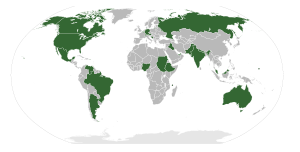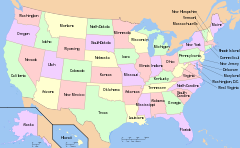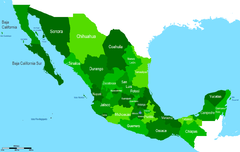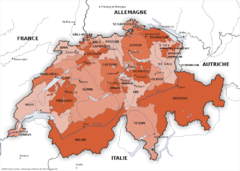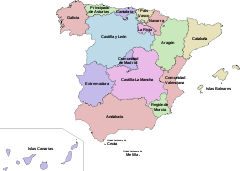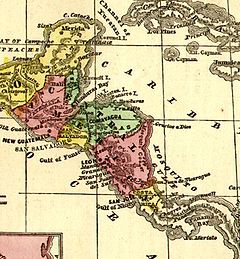- Federation
-
A federation (Latin: foedus, foederis, 'covenant'), also known as a federal state, is a type of sovereign state characterized by a union of partially self-governing states or regions united by a central (federal) government. In a federation, the self-governing status of the component states is typically constitutionally entrenched and may not be altered by a unilateral decision of the central government.
The form of government or constitutional structure found in a federation is known as federalism (see also federalism as a political philosophy). It can be considered the opposite of another system, the unitary state. The government of Germany with sixteen federated Länder is an example of a federation, whereas neighboring Austria and its Bundesländer was a unitary state with administrative divisions that became federated, and neighboring France by contrast has always been unitary.
Federations may be multi-ethnic and cover a large area of territory (like extreme diversity in India), although neither is necessarily the case. Federations are most often founded on an original agreement between a number of sovereign states based on mutual concerns or interests. The initial agreements create a stability that encourages other common interests, brings the disparate territories closer, and gives them all even more common ground. At some time this is recognized and a movement is organized to merge more closely. Other times, especially when common cultural factors are at play such as ethnicity and language, some of these steps in this pattern are expedited and compressed.
The international council for federal countries, the Forum of Federations,[1] is based in Ottawa, Canada. It helps share best practices among countries with federal systems of government, and currently includes nine countries as partner governments.
Contents
Federations and other forms of state
Federations
In a federation the component states are known as in some sense sovereign, in so far as certain powers are reserved to them that may not be exercised by the central government. However, a federation is more than a mere loose alliance of independent states. The component states of a federation usually possess no powers in relation to foreign policy and so they enjoy no independent status under international law.
Some federations are called asymmetric because some states have more autonomy than others. An example of such a federation is Malaysia, in which Sarawak and Sabah entered the federation on different terms and conditions from the states of Peninsular Malaysia.
A federation often emerges from an initial agreement between a number of separate states. The purpose can be the will to solve mutual problems or to provide for mutual defense, or to create a nation state for an ethnicity spread over several states. The former was the case with the United States and Switzerland, the latter with Germany.[clarification needed] However, as the history of countries and nations varies, the federalism system of a state can be quite different from these models. Australia, for instance, is unique in that it came into existence as a nation by the democratic vote of the citizens of each State who voted "yes" in referendums to adopt the Australian Constitution. Brazil on the other hand, has experienced both the federal and the unitary state through its history; some present day States of the Federation retain the borders set during Portuguese colonization (i.e. previous to the very existence of Brazilian state), whereas the latest State (Tocantins) was created by the 1988 Constitution, chiefly for administrative reasons.
Seven of the top ten largest countries by area are governed as federations.
Unitary states
A unitary state is sometimes one with only a single, centralised, national tier of government. However, unitary states often also include one or more self-governing regions. The difference between a federation and this kind of unitary state is that in a unitary state the autonomous status of self-governing regions exists by the sufferance of the central government, and may be unilaterally revoked. While it is common for a federation to be brought into being by agreement between a number of formally independent states, in a unitary state self-governing regions are often created through a process of devolution, where a formerly centralised state agrees to grant autonomy to a region that was previously entirely subordinate. Thus federations are often established voluntarily from 'below' whereas devolution grants self-government from 'above'.
It is often part of the philosophy of a unitary state that, regardless of the actual status of any of its parts, its entire territory constitutes a single sovereign entity or nation-state, and that by virtue of this the central government exercises sovereignty over the whole territory as of right. In a federation, on the other hand, sovereignty is often regarded as residing notionally in the component states, or as being shared between these states and the central government.
Other forms of governance
Confederation
A confederation, in modern political terms, is usually limited to a permanent union of sovereign states for common action in relation to other states.[2]
In Belgium, however, the opposite movement is under way.[3] Belgium was founded as a centralised state, after the French model, but has gradually been reformed into a federal state by consecutive constitutional reforms since the 1970s. Moreover, although nominally called a federal state, the country's structure already has a number of confederational traits (ex. competences are exclusive for either the federal or the state level, the treaty-making power of the Federating units without almost any possible veto of the Federal Government). At present, there is a growing movement to transform the existing federal state into a looser confederation with two or three constitutive states and/or two special regions.[4]
By definition, the difference between a confederation and a federation is that the membership of the member states in a confederation is voluntary, while the membership in a federation is not. A confederation is most likely to feature these differences over a federation: (1) No real direct powers: many confederal decisions are externalised by member-state legislation. (2) Decisions on day-to-day-matters are not taken by simple majority but by special majorities or even by consensus or unanimity (veto for every member). (3) Changes of the constitution, usually a treaty, require unanimity.
Over time these terms acquired distinct connotations leading to the present difference in definition. An example of this is the United States under the Articles of Confederation. The Articles established a national government under what today would be defined as a federal system (albeit with a comparatively weaker federal government). However, Canada, designed with a stronger central government than the U.S. in the wake of the Civil War of the latter, has always been called a Confederation by Canadians. Legal reforms, court rulings, and political compromises have somewhat decentralised Canada in practice since its formation in 1867.
Empire
An empire is a multi-ethnic state or group of nations with a central government established usually through coercion (on the model of the Roman Empire). An empire will often include self-governing regions but these will possess autonomy only at the sufferance of the central government. On the other hand, an empire may simply consist of multiple kingdoms organised together in a federation with a high king designated as an emperor. One example of this was Imperial Germany.
Comparison to other systems of autonomy
Federacy
A federacy is essentially an extreme case of an asymmetric federation, either due to large differences in the level of autonomy, or the rigidity of the constitutional arrangements. The use of the term federacy is more often use to the relation between the sovereign state and its autonomous areas.
Devolution
A federation differs from a devolved state, such as the United Kingdom and the Kingdom of Spain, because, in a devolved state, the central government can revoke the independence of the subunits (Scottish Parliament, Welsh National Assembly, Northern Ireland Assembly in the case of the UK) without changing the constitution.
Associated States
A federation also differs from an associated state, such as the Federated States of Micronesia (in free association with the United States) and Cook Islands and Niue (which form part of the Realm of New Zealand). There are two kinds of associated states: in case of Micronesia, association is concluded by treaty between two sovereign states; in case of Cook Islands and Niue, association is concluded by domestic legal arrangements.
Crown dependencies
The relation between the Crown dependencies of the Isle of Man and the bailiwicks of Guernsey and Jersey in the Channel Islands and the United Kingdom is very similar to a federate relation: the Islands enjoy independence from the United Kingdom, which, via The Crown, takes care of their foreign relations and defence – although the UK Parliament does have overall power to legislate for the dependencies. However, the islands are neither an incorporated part of the United Kingdom, nor are they considered to be independent or associated states. The Isle of Man does not have a monarch, per se; rather, the British Monarch is, ex officio, Lord of Mann (irrespective of the incumbent's sex).
Overseas territories
Overseas territories, such as the British overseas territories, are vested with varying degrees of power; some enjoy considerable independence from the sovereign state, which only takes care of their foreign relations and defence. However, they are neither considered to be part of it, nor recognised as sovereign or associated states.
Alleged de facto federations
The distinction between a federation and a unitary state is often quite ambiguous. A unitary state may closely resemble a federation in structure and, while a central government may possess the theoretical right to revoke the autonomy of a self-governing region, it may be politically difficult for it to do so in practice. The self-governing regions of some unitary states also often enjoy greater autonomy than those of some federations. For these reasons, it is sometimes argued[by whom?] that some modern unitary states are de facto federations.
Spain
Spain is suggested as one possible de facto federation as it grants more self-government to its autonomous communities[5][6] than most federations allow their constituent parts[citation needed]. For the Spanish parliament to revoke the autonomy of regions such as Galicia, Catalonia or the Basque Country would be a political near-impossibility, though nothing bars it legally. Additionally, some regions such as Navarre or the Basque Country have full control over taxation and spending, transferring a small payment to the central government for the common services (army, foreign relations, macroeconomic policy). For example, one scholar discusses the "federal nature of Spain's government (a trend that almost no one denies)."[7] Each autonomous community is governed by a Statute of Autonomy (Estatuto de Autonomía) under the Spanish Constitution of 1978.
People's Republic of China
In the People's Republic of China, a form of de facto federation has evolved without formal legislation. This has occurred as largely informal grants of power to the provinces, to handle economic affairs and implement national policies. This has resulted in a system some have termed "de facto federalism with Chinese characteristics" (in reference to Deng Xiaoping's policy of socialism with Chinese characteristics).[8] Constitutionally, the power vested in the special administrative regions of the People's Republic is granted from the Central People's Government, through decision by the National People's Congress. A Federal Republic of China, in effect the third Chinese Republic, has been proposed as a future replacement for the PRC.
European Union
The European Union (EU) is based on supranational principles which are neither confederal nor federal. Robert Schuman, the initiator of the European Community system, wrote that a supranational Community like the Europe's founding European Coal and Steel Community lay midway between an association of States where they retained complete independence and a federation leading to a fusion of States in a super-state.[9] The European Founding Fathers made a Europe Declaration at the time of the signing of the Treaty of Paris on 18 April 1951 saying that Europe should be organized on a supranational foundation. They envisaged a structure quite different from a federation called the European Political Community.[citation needed]
The EU is a three pillar structure of the original supranational European Economic Community and the nuclear non-proliferation treaty, Euratom, plus two largely intergovernmental pillars dealing with External Affairs and Justice and Home Affairs. The EU is therefore not a de jure federation, although some academic observers conclude that after 50 years of institutional evolution since the Treaties of Rome it is becoming one.[10] The European Union possesses attributes of a federal state. However, its central government is far weaker than that of most federations and the individual members are sovereign states under international law, so it is usually characterized as an unprecedented form of supra-national union. The EU has responsibility for important areas such as trade, monetary union, agriculture, fisheries. Nonetheless, EU member states retain the right to act independently in matters of foreign policy and defense, and also enjoy a near monopoly over other major policy areas such as criminal justice and taxation. Since the Treaty of Lisbon, Member States' right to leave the Union is codified, and the Union operates with more qualified majority voting (rather than unanimity) in many areas.[citation needed]
By the signature of this Treaty, the participating Parties give proof of their determination to create the first supranational institution and that thus they are laying the true foundation of an organized Europe. This Europe remains open to all nations. We profoundly hope that other nations will join us in our common endeavour.
— Europe Declaration signed by Konrad Adenauer (West Germany), Paul van Zeeland, Joseph Meurice (Belgium) Robert Schuman (France) Count Sforza (Italy) Joseph Bech (Luxembourg) and Dirk Stikker, J. R. M. van den Brink (The Netherlands).[11]
Europe has charted its own brand of constitutional federalism.[citation needed]
Those uncomfortable using the "F" word in the EU context should feel free to refer to it as a quasi-federal or federal-like system. Nevertheless, for the purposes of the analysis here, the EU has the necessary attributes of a federal system. It is striking that while many scholars of the EU continue to resist analyzing it as a federation, most contemporary students of federalism view the EU as a federal system.[citation needed]
(See for instance, Bednar, Filippov et al., McKay, Kelemen, Defigueido and Weingast)— R. Daniel Kelemen
A more nuanced view has been given by the German Constitutional Court. Here the EU is defined as 'an association of sovereign national states (Staatenverbund)'.[12] With this view, the European Union resembles more of a confederation.
Russian Federation
The Russian Federation has inherited its structure from the Russian Soviet Federative Socialist Republic (RSFSR) that was one of the 15 republics of the Soviet Union and itself was considered a federation of national territories. The RSFSR consisted of autonomous republics, which had a certain degree of autonomy, at least de jure, and of other types of administrative units (oblasts and krais), whose status was the same as that of oblasts in other – mostly unitary – Soviet Socialist Republics. Today's Russia is defined as a federation in its Constitution (Article 5),[13] and Russia's federal subjects, i.e., the constituent republics, oblasts, krais, the federal-level cities of Moscow and Saint Petersburg, as well as one autonomous oblast and four autonomous (national) okrugs, are equal in legal terms, save for some symbolic features allowed to republics (constitution, president, national language). Some regions (Yakutia[14][15]) have concluded agreements with the Federation so as to modify the degree of their autonomy.[citation needed]
According to an amendment passed in December 2004, governors and presidents of Russia's constituent regions, who were previously elected by popular vote, are now proposed by the President of Russia for the approval of the local parliament[16] Local parliaments theoretically have the authority to reject the candidate, but if this occurs three times, the parliament may be dissolved by the President and new parliamentary elections held. This lets some argue[citation needed] that the Russian Federation is not a federation in the strictest sense and that it has centralized features similar to a unitary system.[17][not in citation given]
Internal controversy and conflict
Certain forms of political and constitutional dispute are common to federations. One issue is that the exact division of power and responsibility between federal and regional governments is often a source of controversy. Often, as is the case with the United States, such conflicts are resolved through the judicial system, which delimits the powers of federal and local governments. The relationship between federal and local courts varies from nation to nation and can be a controversial and complex issue in itself.
Another common issue in federal systems is the conflict between regional and national interests, or between the interests and aspirations of different ethnic groups. In some federations the entire jurisdiction is relatively homogeneous and each constituent state resembles a miniature version of the whole; this is known as 'congruent federalism'. On the other hand, incongruent federalism exists where different states or regions possess distinct ethnic groups.
The ability of a federal government to create national institutions that can mediate differences that arise because of linguistic, ethnic, religious, or other regional differences is an important challenge. The inability to meet this challenge may lead to the secession of parts of a federation or to civil war, as occurred in United States and Switzerland. In the case of Malaysia, Singapore was expelled from the federation because of rising racial tension. In some cases internal conflict may lead a federation to collapse entirely, as occurred in Nigeria, the Federation of Rhodesia and Nyasaland, the United Provinces of Central America and the West Indies Federation. Somalia, despite its Transitional Federal Charter, Transitional Federal Parliament, and Transitional Federal Government, has a weak central government: since 1992, federal institutions have rarely controlled territory outside of parts of Mogadishu (though this is changing)[vague] and the Somaliland region in the northwestern part of the country is autonomous.
List of federations
For a detailed list of federated units, see Federated state#List of constituents by federation. There are 27 federations as of July 2011.[18]
Contemporary
Year Est. Federation Federating Units Major Federating Units Minor Federating Units  Argentina
ArgentinaProvinces of Argentina 23 provinces 1 autonomous city 1901  Australia
AustraliaStates and territories of Australia 6 states 10 territories  Austria
AustriaStates of Austria 9 Länder or Bundesländer  Belgium
BelgiumDivisions of Belgium 3 Communities, 3 Regions  Bosnia and Herzegovina
Bosnia and HerzegovinaDivisions of Bosnia and Herzegovina 2 entities (out of which one is itself a federation, consisting of 10 cantons) 1 district  Brazil
BrazilStates of Brazil 26 states 1 federal district and 5,561 municipalities  Canada
CanadaProvinces and territories of Canada 10 provinces 3 territories  Comoros
Comoros3 islands  Ethiopia
EthiopiaRegions of Ethiopia 9 regions 2 chartered cities  Germany
GermanyStates of Germany 16 Länder or Bundesländer  India
IndiaStates and territories of India 28 States 7 Union Territories, including a National Capital Territory  Iraq
IraqGovernorates of Iraq 18 governorates, including the autonomous region of Kurdistan.  Malaysia
MalaysiaStates of Malaysia 13 states 3 federal territories  Mexico
MexicoStates of Mexico 31 states 1 federal district  Federated States of Micronesia
Federated States of Micronesia4 states  Nepal
NepalZones of Nepal 14 zones 75 districts  Nigeria
NigeriaStates of Nigeria 36 states 1 territory  Pakistan
PakistanProvinces and territories of Pakistan 4 provinces 4 federal territories including a federal capital territory  Russian Federation
Russian FederationFederal subjects of Russia 21 republics, 46 oblasts, 9 krais, 1 autonomous oblast, 4 autonomous okrugs, 2 federal-level cities[19]  Saint Kitts and Nevis
Saint Kitts and NevisIslands/parishes of Saint Kitts and Nevis 2 islands/14 parishes  South Africa
South AfricaProvinces of South Africa 9 provinces  South Sudan
South SudanStates of South Sudan 10 states  Spain
SpainAutonomous communities of Spain 17 autonomous communities 2 autonomous cities  Sudan
SudanStates of Sudan 15 states  Switzerland
SwitzerlandCantons of Switzerland 26 cantons  United Arab Emirates
United Arab EmiratesEmirates of the UAE 7 emirates  United States of America
United States of AmericaStates of the United States 50 states 1 federal district; 1 incorporated territory, 13 unincorporated territories  Venezuela
VenezuelaStates of Venezuela 23 states 1 federal district, 1 federal dependency Long form titles
- Federal Republic of: Germany, Nigeria.
- Federation: Russia, Saint Kitts and Nevis
- Federative Republic of: Brazil
- Republic of: Argentina, Austria, India (also called Indian Union), Iraq, South Africa, Sudan.
- Others:
- Bolivarian Republic (Venezuela)
- Confederation (Switzerland)
- Commonwealth (Australia)
- Dominion (Canada before 1982)
- Federal Democratic Republic (Ethiopia, Nepal)
- Federated States (FS Micronesia)
- Federative Republic (Brazil)
- Islamic Republic (Pakistan)
- Kingdom (Belgium)
- Union (Comoros)
- United Emirates (United Arab Emirates)
- United Mexican States (Mexico)
- United States (United States)
- None:
- Bosnia and Herzegovina (since 1997)
- Canada (since 1982)
- Malaysia
Defunct
- Federal Republic of Cameroon (1961–1972)
- United Provinces of Central America (1823 – circa 1838)
- Confederate States of America (1861–1865)
- United States of Colombia (1863–1886)
- Czechoslovakia (1969–1992)
- Federated Dutch Republic (1581–1795)
- French Equatorial Africa (1910–1960)
- French West Africa (1904–1958)
- Inca Empire (1197–1572)
- United States of Indonesia (1949–1950)
- United Kingdom of Libya (1951–1963)
- Federated Malay States (1896–1946)
- Federation of Malaya (1948–1963)[20]
- Mali Federation (1959–1960)
- New Granada (1855–1886)
- Polish-Lithuanian Commonwealth (1569–1795)
- Federation of Rhodesia and Nyasaland (1953–1963)
- Federation of South Arabia (1962–1967)
- Union of Soviet Socialist Republics[21] (1922–1991)
- Federal Republic of Spain (1873–1874)
- Uganda (1962–1967)
- West Indies Federation (1958–1962)
- Socialist Federal Republic of Yugoslavia[22] (1943–1992)
- Federal Republic of Yugoslavia (1992–2003)
Some of the proclaimed Arab federations were confederations de facto.
See also
- Anti-Federalist
- Capital city
- Corporative federalism
- Constitutional economics
- Political economy
- Rule according to higher law
- European Union
- European Coal and Steel Community
- Federacy
- Federalism in Australia
- Federalist
- The Federalist Papers
- Federal monarchy
- Federated state
- Federation of Australia
- Foederati
- Indian Union
- International organisation
- Międzymorze (Intermarum)
- Multinational state
- Neo-functionalism
- New federalism
- Regional state
- Supranationalism
- Supranational union
- Unitary state
- United Federation of Planets
- World Federalist Movement
- Centre for Studies on Federalism
Footnotes
- ^ Forum of Federations
- ^ Oxford English Dictionary
- ^ One of the most important recent books about the Belgian institutions, written by one of the leading French-speaking jurists concludes : Vers le confédéralisme (Toward a Confederation). See: Charles-Etienne Lagasse, Les nouvelles institutions politiques de la Belgique et de l'Europe, Erasme, Namur 2003, p. 603 ISBN 2-87127-783-4
- ^ Many Flemings would prefer two states, Flanders and Wallonia, and two special regions, Brussels and the German-speaking region. In Wallonia, there is a wider support for three states : Flanders, Wallonia and Brussels.
- ^ Mallet, Victor (18 August 2010). "Flimsier footings". Financial Times. http://www.ft.com/cms/s/0/de6c00f0-8c25-11de-b14f-00144feabdc0.html. Retrieved 25 August 2010.(registration required)
- ^ "A survey of Spain: How much is enough?". The Economist. 6 November 2008. http://www.economist.com/specialreports/displaystory.cfm?story_id=12501023. Retrieved 25 August 2010.(subscription required)
- ^ Enrique Guillén López, JUDICIAL REVIEW IN SPAIN: THE CONSTITUTIONAL COURT, 41 Loyola of Los Angeles Law Review 541, 544 (2008).
- ^ Economic Warlords by Gregory H. Fuller
- ^ La Communaute du Charbon et de l'Acier, p7 Paul Reuter with preface by Robert Schuman. Paris 1953.
- ^ How the court made a federation of the EU.[1] Josselin (U de Rennes-1/CREM) and Marciano (U de Reims CA/CNRS).
- ^ Schuman or Monnet? The real Architect of Europe. p 129. Bron 2004
- ^ BVerfG, 2 BvE 2/08 vom 30.6.2009, Absatz-Nr. (1 - 421)
- ^ Constitutional definition of Russia as a federation Article 5 of Russian Constitution.
- ^ YAKUTIA: AUTONOMY AND DIAMONDS, December 1, 1996
- ^ Yakutia (Russia) CRW Flags
- ^ Amendments to the law on appointment of heads of Russia's federal subjects, 11 December 2004.
- ^ Russia's year of shrinking liberties BBC News
- ^ Forum of federations http://www.forumfed.org/en/federalism/by_country/index.php
- ^ Federal structure of Russia, Article 65 of Russian Constitution.
- ^ Gained independence in 1957, joined with Sabah, Sarawak, and Singapore to form Malaysia in 1963.
- ^ The USSR was a federation according to the letter of its constitution, but, at least until its final years in the late eighties and early nineties of the 20th century, its governance was highly centralised in practice. See: Soviet Union section.
- ^ The Socialist Federal Republic of Yugoslavia was officially proclaimed in 1963. Prior to this, the communist Yugoslav state was named Democratic Federal Yugoslavia in 1943 and then Federal People's Republic of Yugoslavia in 1946. See: Socialist Federal Republic of Yugoslavia.
Autonomous types of first-tier subdivision administration Federalism Federation (Federated state) · Asymmetric federalism · Dual federalism · Federacy · Federal monarchySee also |
Categories:- Federalism
- Federal countries
- Supraorganizations
- Lists of country subdivisions
Wikimedia Foundation. 2010.

